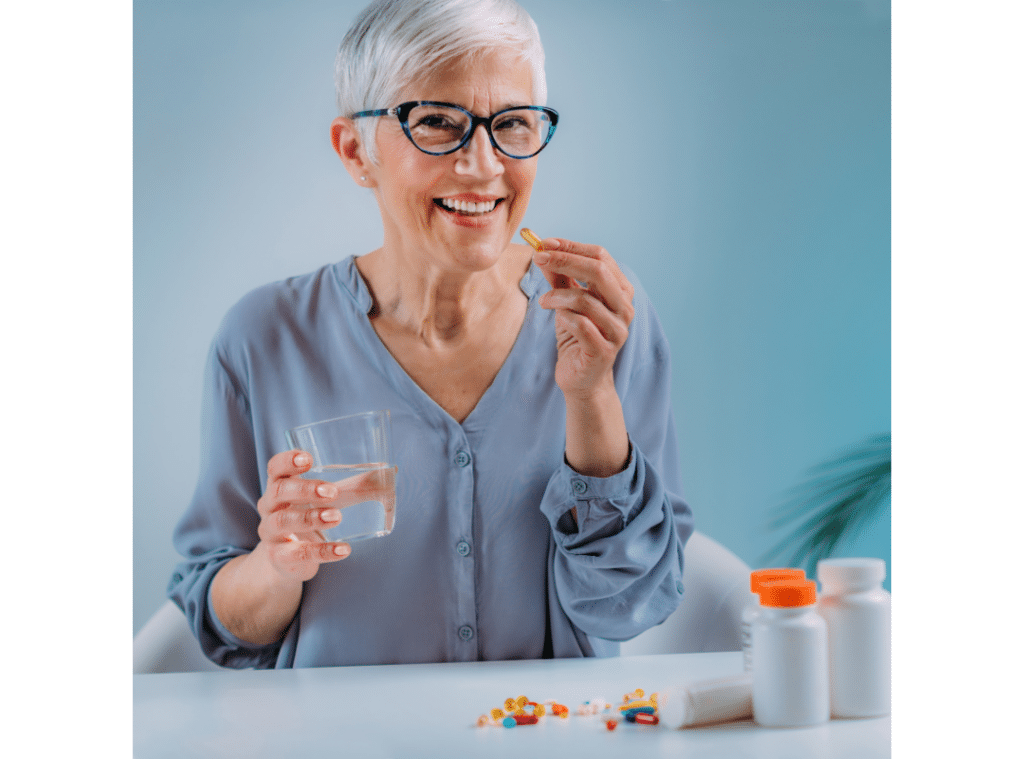As we age, our bodies undergo numerous changes that impact nutritional needs. Maintaining proper nutrition becomes increasingly important with age-related declines in appetite, nutrient absorption, and physical activity. That’s where supplements for the elderly come in—they can help bridge the gap between what we eat and what our bodies need.
While a healthy diet remains the foundation of senior health, supplements offer targeted support for areas like bone strength, energy, cognition, and immunity. Whether you’re looking for the best multivitamin for seniors over 70, or you’re considering the best supplements for old age woman or man, understanding what your body needs is the first step to aging with vitality and strength.
What Are Supplements for the Elderly and Why Are They Important?
Supplements for the elderly refer to vitamins, minerals, and other nutrients taken to support aging bodies that may not absorb or retain nutrients as efficiently. These can include pills, powders, liquids, or chewable nutrients often lacking in senior diets. Commonly supplemented nutrients include calcium, vitamin D, vitamin B12, and omega-3 fatty acids.
Many seniors struggle with reduced appetite or dietary restrictions, which makes it harder to get all essential nutrients from food alone. That’s why the best nutritional supplements for the elderly often contain high doses of essential vitamins and minerals tailored to meet the unique needs of aging bodies.
At Westmont of Encinitas, we help residents strike the right balance between food and supplements, ensuring they enjoy both optimal nutrition and a high quality of life.
Choosing the Best Multivitamin for Seniors Over 70
One of the most frequently asked questions is: What is the best multivitamin for seniors over 70? The answer depends on individual needs, but good multivitamins for seniors typically include:
- Vitamin D and calcium for bone strength.
- Vitamin B12 supports nerve and brain health.
- Magnesium and potassium for heart health.
- Folic acid for cellular repair and energy.
Multivitamins can provide a convenient way to support immune function, cognition, and mobility. Always choose a product that is specifically designed for your age group and gender—there are distinct formulations for both the best supplements for old age man and woman.
Essential Vitamins for Seniors Over 70
Meeting the body’s nutrient needs becomes more challenging after 70, but it is also more important than ever. Here are some vitamins for seniors over 70 that should be prioritized:
- Vitamin B12 – Seniors often have difficulty absorbing this vitamin from food. A supplement can help prevent fatigue, confusion, and neurological issues.
- Vitamin D – Crucial for maintaining strong bones and preventing falls.
- Calcium – Essential for post-menopausal women to prevent osteoporosis.
- Vitamin E – Supports immunity and eye health.
- Omega-3 Fatty Acids – Beneficial for brain and heart health.
Combining food and supplementation ensures these essential nutrients are adequately supplied, helping seniors maintain their independence and well-being.
The Best Supplements for Older Women
For women, nutritional needs change significantly after menopause. The best supplements for an older woman include:
- Calcium and Vitamin D are needed to maintain bone density.
- Iron (if deficient), especially in cases of fatigue or anemia.
- Omega-3s for heart and cognitive health.
- Magnesium for muscle function and blood pressure control.
Many women also benefit from supplements that support skin, joint, and hormone health. Collagen, biotin, and evening primrose oil are additional supplements that might be considered based on individual goals.
Read more about common nutrient deficiencies in aging women through this guide from the National Institute on Aging.
The Best Supplements for an Old Man
The best supplements for an old age man include a similar foundation of calcium, vitamin D, and B12, but may also place a greater emphasis on:
- Zinc and selenium for prostate and immune health.
- Coenzyme Q10 (CoQ10) for heart function and energy.
- Lutein for eye health.
- Turmeric or curcumin for joint support and inflammation.
Men often experience age-related muscle loss and cardiovascular changes, making it important to tailor supplementation accordingly. Selecting high-quality, third-party tested supplements ensures purity and effectiveness.
Explore Mayo Clinic’s suggestions for men’s vitamins and minerals.

Best Nutritional Supplements for the Elderly: How to Choose
The best nutritional supplements for the elderly combine science-backed ingredients, transparency in labeling, and alignment with your health conditions. When selecting a supplement:
- Look for products certified by USP, NSF, or ConsumerLab.
- Choose age-appropriate formulations.
- Avoid mega-doses unless directed by a doctor.
- Talk to a healthcare professional to avoid drug interactions.
Whole-food-based supplements are often easier on the stomach and may offer better absorption. Whether you’re looking for a general multivitamin for seniors over 70 or a targeted solution for a specific concern, ensure it aligns with your health history.
The Importance of Personalized Supplement Plans
Personalization is key when it comes to supplements for the elderly. Not everyone needs the same nutrients, and taking the wrong supplement can sometimes do more harm than good. If you’re already taking prescription medications or managing chronic conditions, it’s even more important to consult with a physician or registered dietitian.
At Westmont Living, we promote a wellness model that blends professional guidance with informed choices to help residents enjoy longer, healthier lives.
You may also benefit from participating in a local senior nutrition program, which can complement your supplement regimen.
Avoiding Risks: The Smart Way to Supplement
While supplements can be beneficial, they are not without risks. Over-supplementation can lead to toxicity, especially with fat-soluble vitamins like A, D, E, and K. Interactions with medications such as blood thinners, diuretics, and thyroid medications are common.
Some tips for avoiding risks:
- Always read the label and check for interactions.
- Stick to recommended dosages.
- Inform your healthcare provider about all supplements you’re taking.
- Monitor for side effects like nausea, dizziness, or irregular heartbeat.
Routine health checks and regular screenings are vital in ensuring your supplement choices remain safe and effective.
A Better You, One Capsule at a Time
Your health journey doesn’t end with age—it evolves. Whether you’re interested in boosting energy, improving bone strength, or supporting cognitive health, supplements for the elderly can be a practical and effective addition to your routine. From the best multivitamin for seniors over 70 to gender-specific supplements for men and women, today’s options are smarter and more targeted.
At Westmont of Encinitas, we help residents make informed choices about their wellness, including nutrition, supplements, and beyond. Call us at 760-452-6037 or schedule a Tour to learn more about how we support healthy aging with personalized care.
Choose wisely, supplement smartly, and embrace every year with energy and vitality.
Dive into the vibrant life our Westmont communities have to offer.Find Where You Belong
Frequently Asked Questions
What are the best supplements for old age?
The best supplements for old age typically include vitamin D, calcium, vitamin B12, magnesium, and omega-3 fatty acids. As the body ages, these nutrients help support bone health, brain function, and heart health. A multivitamin tailored for seniors can also fill nutritional gaps. Always consult a healthcare provider before starting any supplement.
What supplements are good for elderly people who are not eating?
For elderly individuals with poor appetite or eating difficulties, nutritional shakes and supplements like protein powders, vitamin D, calcium, and B-complex vitamins can be beneficial. These help maintain muscle mass, energy, and overall health. Products like Ensure or Boost offer balanced nutrition in a drinkable form. It’s essential to address the root cause of the poor appetite alongside supplementation.
What is the number one anti-aging supplement?
Collagen peptides and Coenzyme Q10 (CoQ10) are often regarded as top anti-aging supplements for skin health and cellular energy production. Resveratrol and omega-3 fatty acids also show strong anti-aging potential by reducing inflammation and oxidative stress. While there is no single “magic pill,” these supplements may help slow visible and internal signs of aging. Consistency and healthy lifestyle habits play a key role as well.
What is the most common vitamin deficiency in the elderly?
Vitamin B12 deficiency is most common in older adults due to decreased absorption with age. Low levels can lead to fatigue, memory issues, and even nerve damage. Vitamin D is also frequently deficient, especially in those with limited sun exposure. Regular blood tests can help monitor and correct these deficiencies.








